
The DTU Executive
Louisa Hadley, President
President@dtu.qc.ca
Brian Seivewright, VP Internal
VPInternal@dtu.qc.ca
Mélanie Beck, VP External
VPExternal@dtu.qc.ca
Antonia Fikkert, Secretary-Treasurer
Secretary_Treasurer@dtu.qc.ca
Emilie Richer, Grievance Officer
grievanceofficer@dtu.qc.ca
Administrative Assistant
Elisabeth Leone
Elisabeth@dtu.qc.ca
DTU email: dtu@dtu.qc.ca
In this issue:
Welcome message
Faculty Vacation dates
French Survey Results
Updates to CA
Health and Safety
DTU Annual Party
Elections and GA
GOS Entente
Upcoming Leaves deadlines
Professional Development Funds
Your Rights, Explained
We hope that you enjoyed the March break and that the semester is going well. As always, the DTU Executive invites you to drop by our office in 8A.11. We can answer questions regarding workloads, seniority and priority, schooling and work experience documentation, and anything else related to working at Dawson. In particular, before turning down work we encourage you to come and discuss the implications with us. We always recommend copying us into communications with the College so that we can help to make sure that your rights are protected. You can also call us at local 1799, or email us at dtu@dtu.qc.ca with any questions.
Faculty Vacation and Availability
For teachers with a day contract or a Cont. Ed. charge, the last day of availability for this academic year is June 13. The vacation period is from June 14 to August 18, inclusive. Teachers are expected to be available to the College until the vacation period begins. Although the nature of our work alters after classes end, teachers are expected to be available to attend meetings with the College if required. For full-time teachers, availability is 32.5 hours per week. For part-time teachers, availability is proportional to the workload.
Given the Fall 2024 Academic Calendar has classes starting on August 19, there are no days of faculty availability before classes begin. Additionally, availability ends in June only two days after the Grade deadline; we are especially concerned about precarious teachers who often receive their workloads only after the end of availability in June. We asked the College to consider altering the Academic Calendar to allow more time for faculty to prepare for classes. However, the Academic Calendar recently sent to the community confirmed that they have not altered the start date of Fall semester classes.
The Academic Calendar seems to prioritize “study days” over availability for faculty to prepare classes. However, when Senate voted on the Academic Calendar the faculty vacation period had not been set and so Senators did not have complete information regarding availability. We have advised the College that if they maintain the current Academic Calendar, this will impact the level of preparedness for the start of the semester, in terms of classes as well as staffing. However, the College has indicated that since Senate has pronounced itself on the matter already, it will leave it to Senators to bring back any issues if they believe it to be necessary.
We remind you that you do not have to work during the vacation period and that the College cannot expect you to. We understand that this means that classes may not be prepared and that Course Outlines will be delayed. For coordinators, we remind you that you are not expected to work prior to the start of availability and ask that you contact us if the College requires you to work during the vacation period.
Teachers who wish to be unavailable to the College prior to the beginning of the vacation period can request a transfer of availability. You need to complete the form provided by the College in advance of the period you are transferring. Note that the form asks what activities you propose to make up for the period of unavailability; you do not have to provide too much detail here. It is sufficient to indicate something along the lines of “course prep” or “departmental work”.
French Survey Results
As you may recall, the College recently sent out a survey to all faculty regarding their ability and interest in teaching courses in French. This survey was co-sponsored by the DTU as we believe it is important for departments to have a clear and accurate view of their staffing capabilities in light of the introduction of courses to be taught in French.
The survey has now closed and the Academic Dean’s office has shared the results with the DTU. Overall, 39.5% of respondents indicated that they were sufficiently proficient to teach in French. 16.5% of respondents indicated that they were both proficient and interested in teaching in French, with a further 14.6% who indicated they were proficient and “neutral” about teaching in French.
The need for teaching in French varies greatly between departments, however, so it is important that individual departments initiate discussions regarding the staffing of the courses in your department that have been identified as those to be taught in French. We believe that it is important that these conversations happen at the department level and that they are fully transparent. The Academic Dean’s office has sent to each department its results, which take two forms: an overall summary of the results for your department as well as individualized responses from all faculty in your department. As a reminder, the survey was not anonymous and faculty were informed that this information would be shared with their department, so you should expect to receive it soon.
During these departmental discussions it is important to keep in mind the goal of minimizing the negative impacts of law 14 on faculty working conditions. The intention is to assign courses in French to those who expressed both an ability and willingness to teach them in the first instance. However, it may be necessary to assign courses to those who are able but expressed that they were neutral or not interested in teaching in French. This is important as it is the responsibility of all teachers to ensure the quality and the content of the courses offered in their department. Moreover, your department may need to consider how to distribute courses to be taught in French fairly so that they are not simply passed down the list to a teacher who may not be able to take them.
It is also important to keep in mind that FNEEQ and the administrations of the anglophone cégeps are jointly negotiating an agreement with the government to introduce some protections into the Collective Agreement for those teachers who are unable to teach in French. The details are still to be finalised but possibilities that are being explored include a leave to protect the seniority of teachers who are unable to take on work as well as access to training for teachers who need additional support to be able to teach in French in the future. More details about these negotiations were presented in the February edition of the Owl Hoots. The DTU Executive is available to attend departmental discussions if requested.
Update on the New Collective Agreement
The exact wording of clauses of the new Collective Agreement are still being finalised by the government and union negotiation teams. Given that the union negotiation teams are still waiting for the text from their government counterparts, it is unlikely the Collective Agreement will be signed before the end of May. Once the Collective Agreement has been signed, it will be in effect; we will then also know the time-frame for the retroactive salary payment. In the past, colleges have had 120 days from the date of signature to disburse the retro pay, but the union side is currently advocating for that to be reduced. We will communicate with all members once the Collective Agreement is signed and will provide more detailed information regarding the implications for salaries.
We would also like to take this opportunity to highlight some changes that will take effect once the new Collective Agreement is signed.
Professional Development Leave
The new Collective Agreement brings in deadlines for applications for a Professional Development Leave. For the Fall semester or the whole of the following academic year, the deadline will be May 15th; for the Winter semester the deadline will be November 15th.
Online Teaching
The new Collective Agreement will bring in clearer guidelines about the development of online teaching in the Cegep network. Although the wording has not been finalised, it will include a statement that colleges privilege in-person learning and that online (or blended) learning must respond to a specific need identified in the community. In addition, there should be more active consultation of departments, programs, and senate in advance of the implementation of any online teaching projects as well as more opportunities for these groups (and the Union) to ask for an evaluation of the projects.
Modified CI formula for 30-hr-course workloads
In the past, the number of students in 30-hour courses was not taken into account for the NES factor in CI calculations. Under the new Collective Agreement, there will be a specific formula applied to calculate the NES factor for workloads including 30-hour courses. The NES factor takes into account the number of students a teacher has in a given semester and thus is a significant gain for Physical Education teachers who often have 200 students a semester.
Post-Creating EESH resources
Our previous collective agreement required that a minimum of 35% of EESH resources (Soutien à la réussite scolaire des étudiantes ou des étudiants en situation de handicap) be used to create permanent positions. Despite our repeated requests to the College to increase this percentage, the College refused and purposefully injected these resources parsimoniously in many disciplines to avoid creating permanence. The minimum has now been increased to 75%, which corresponds to an increase from 2 ETC to 4 ETC of resources. This gain will hopefully stabilize the resources departments obtain from this envelope and possibly create new permanent positions.
Health and Safety at Dawson
There have been some recent changes in the law regarding how employers have to handle health and safety issues in the workplace. Although these changes came into effect in April 2022, some of the practical applications have only recently been implemented at Dawson. We wanted to take this opportunity, therefore, to provide some updates.
Health and Safety Committee – there is a Health and Safety Committee at Dawson which brings together College representatives as well as representatives from the three employee unions (DTU, DSSU, ADP) and a student representative. The Committee usually meets two or three times a semester and has a mandate to make recommendations to the College regarding health and safety issues as well as prevention activities. If you are aware of any health and safety concerns that you feel should be addressed by the Committee, we encourage you to inform us at dtu@dtu.qc.ca.
Health and safety Representative – the new law brought into effect a single Health and Safety Representative for all employees. For this year, the Health and Safety Representative is Serge Corchia from the DSSU. This position comes with release to allow the representative to follow up on all situations related to health and safety at the College. For the remainder of this semester, Serge Corchia will be working on this dossier on Wednesdays – you can reach him either in the DSSU office (8A.9) or via email at scorchia@dawsoncollege.qc.ca. Of course, you can contact him at any time for more urgent issues. We encourage you to copy the DTU in all communications with the Health and Safety Representative.
Emergencies – In cases of emergency, you should call security at 1000. Note that although these calls go to the main Security desk, they are indicated as an emergency call, so the person answering should be aware that it is an emergency situation. We have heard in the past about issues with security guards asking members of the community to speak in French; we have been assured that almost all security guards are able to communicate in English and that in the case of an emergency there would be someone available who could respond in English.
Accidents and Incident Reports – If you experience an accident or incident at the College, it is important that you complete the reporting form, which can be found online here, and make sure to inform the DTU. Even if the incident does not seem serious, it is useful for the Health and Safety Committee to be able to assess trends and identify possible areas to be addressed.

Due to the strike last semester, we were not able to host our usual annual party to celebrate new perms and retirees. We are happy to announce that there will be a delayed party on Thursday, May 23rd, which is the last day of classes. The party will feature all the usual food, drink, and collegiality so come join us to celebrate your colleagues and the end of the year!
Note: the College is also organising a replacement for its holiday party on May 3rd! The College is asking for RSVPs on omnivox by April 17th. We tried to coordinate the two parties but unfortunately the numerous activities scheduled for May has made it impossible.
Mark your calendars with these two opportunities to celebrate with your colleagues!
 Election Season
Election Season
The DTU Election period for 2024-2025 is approaching. We will be holding elections for all DTU positions as well as positions on the Senate and Board of Governors. If you are interested in getting involved or would like to know more about the positions and what is involved, we encourage you to speak to us.
The nomination period will run from April 8th to 24th; an email will be sent to all members with the nomination form and information on positions available. Once the nomination period has closed, candidate statements for union-wide positions will be sent to all members.
Candidates for DTU-wide positions will present themselves at the next General Assembly and the voting period will open at the end of the meeting. The voting period will continue in the Upper Atrium for at least one additional day. Full details of when and where to vote will be sent to all members. The date of the General Assembly will be announced after the Executive Council meeting on April 10th, and will likely be in late April.
General Offer of Service (GOS)
As was the case last year, the College and the Union have reached an agreement to have an “automatic” General Offer of Service (G.O.S.) process for the coming academic year. This means that non-permanent teachers will not need to complete a form to exercise their priority for workloads for the coming academic year.
Specifically, this means that non-permanent teachers will automatically be considered as exercising their priority on all available workloads for Fall 2024, and Winter 2025, and Summer 2025. You can still accept or refuse work depending on your particular circumstances, though we always advise you to consult with the DTU before refusing a workload to make sure that you understand the implications for your future hiring priority.
Although your coordinator may inform you of your workload, it is important to know that this is only provisional. The official confirmation of workloads is done by Human Resources once they have completed relevant verifications, and will be subsequently communicated to you.
Important Reminder: individual teachers have an obligation to ensure that their double employment status is updated with the College. Any teacher who has a full-time contract outside of Dawson, or who has a reasonable expectation of full-time employment for a given semester, is considered to be double employed when exercising their priority on a teaching workload at Dawson. If you are newly in a situation of double employment, or are no longer double employed, you should inform HR by emailing hrfaculty@dawsoncollege.qc.ca. If you are unsure whether your situation constitutes double employment, we encourage you to contact us at dtu@dtu.qc.ca.
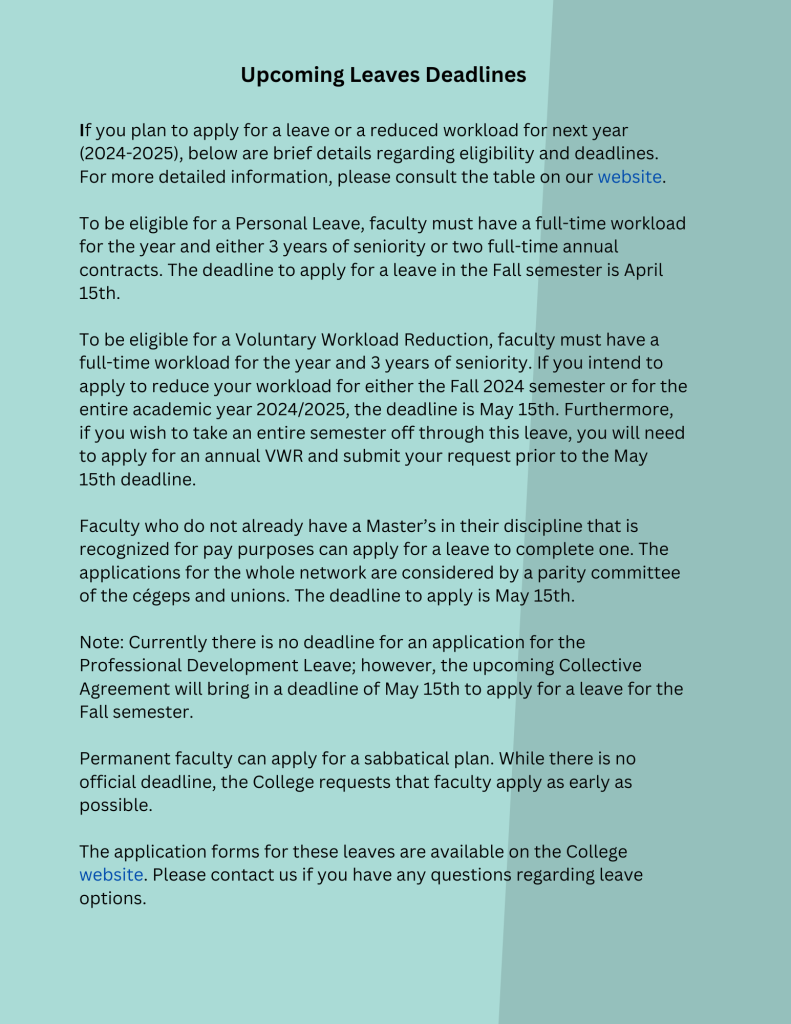
Professional Development Funds
Professional Development Funds are available to all faculty (whether in the Regular or Cont. Ed. sector) and can be used to fund professional development activities such as attending workshops, participating in conferences, and taking courses. Teachers can also apply for a reimbursement of up to $100 for computer equipment.
For your request to be considered at the next meeting of the Professional Development Fund Committee, submit it as soon as possible at room 8A.11 or by email (pdfsecretary@dawsoncollege.qc.ca).
We ask that applications be submitted prior to the date of the proposed activity. The Committee will be meeting to review applications the following week.
Your Rights, Explained
Teacher Evaluations
The Office of Academic Development is in the process of sending out information to faculty who are being evaluated this semester. So, we wanted to take this opportunity to remind you of your rights and responsibilities regarding this process.
The DTU does not endorse the College’s process of evaluating teachers for various reasons; in particular, numerous research studies (see for example Peterson et al 2019 or Kreitzer and Sweet-Cushman 2021) have shown that student evaluations are subjective and biased, especially towards faculty from minority groups. We have repeatedly brought up our concerns about these evaluations with the College and take particular issue with the question “would you recommend this teacher to a friend.” Despite this, the College continues to use the existing evaluations.
Teachers cannot opt out of the evaluation process; however, we recommend that teachers do not participate in any self-assessment that may be requested as part of the evaluation as this lends credence to what we believe is a flawed process.
Although you cannot opt out of the evaluations, you can ask for them to be rescheduled. If the timing of the evaluations is not appropriate for your class schedule, you can request that the Office of Academic Development reschedule it to another date in the semester. If you feel that an evaluation in a given semester would not be appropriate based on your circumstances (whether pedagogical or personal), you can ask your Sector Dean to delay the evaluations. Note, this usually delays the evaluations by only one semester.
In normal circumstances, Regular Day teachers (whether permanent or not) can expect to be evaluated 1 out of every 4 semesters on a random basis. This means that it is possible for a teacher to be selected for evaluation in consecutive semesters. However, if a teacher’s evaluation is “flagged” by the Dean then they can expect a more frequent evaluation schedule (1 out of every 2 semesters). Teachers who have been flagged should receive an email from their Dean; however, if you feel that there is an issue with the frequency of your evaluations, you should write to your Sector Dean to ask for clarification as to whether you have been flagged.
The DTU also has concerns regarding the College’s policy for flagging evaluations. We recently learned that the flagging process is done by someone external to the College and that these are meant to be reviewed by the Sector Dean to determine whether the flag is warranted.

It is problematic that the responses to the question “I would recommend this teacher to a friend” are given so much weight in the flagging criteria. This question is extremely subjective and does not address a teacher’s abilities. There are many reasons for which a student would, or would not, recommend a teacher to a friend and we are concerned that this turns the evaluations into a popularity contest. In the age of RateMyProfessor, teachers already have to contend with students sharing information and making decisions about teachers before they’ve even experienced the classroom environment.
If you have been flagged and are convened to a meeting with your Sector Dean, a DTU Representative can accompany you. Email us at dtu@dtu.qc.ca to make the arrangements.
Your Rights, Explained
Grade Review Committee
While students’ rights and responsibilities regarding grade reviews are set out in ISEP, the Grade Review Committee is part of our Collective Agreement.
Before a student requests a grade review, they should be encouraged to discuss the situation with their teacher. A student can request a grade review only once the final grade for the course has been submitted to the College. The student’s request must be submitted to the relevant Sector Dean within 30 calendar days of the official grade deadline of the semester. The Dean determines whether to grant a grade review request from a student, and in the event that the request is granted, they contact the department to ask that a Grade Review Committee be convened.
A few things to keep in mind about how the Grade Review Committee functions:
- It is an independent committee; the administration has no authority over how the committee functions.
- It is composed of three teachers from the discipline, one of which is the teacher responsible for the original evaluation.
- The committee determines among itself how it wishes to function; for example, whether to meet in person, whether to make its decision via email, the distribution of tasks among committee members.
- The committee determines whether or not it feels it is necessary to meet with the student; the student has an obligation to present their case along with supporting evidence as part of the request process.
- The committee communicates its decision to the Dean; the committee can determine to increase, decrease or maintain the original grade.
- The decision of the Grade Review Committee is final.
Dawson Teachers Union
3040 Sherbrooke, Westmount, Suite 8A.11
514-931-8731 ext 1799
dtu@dtu.qc.ca

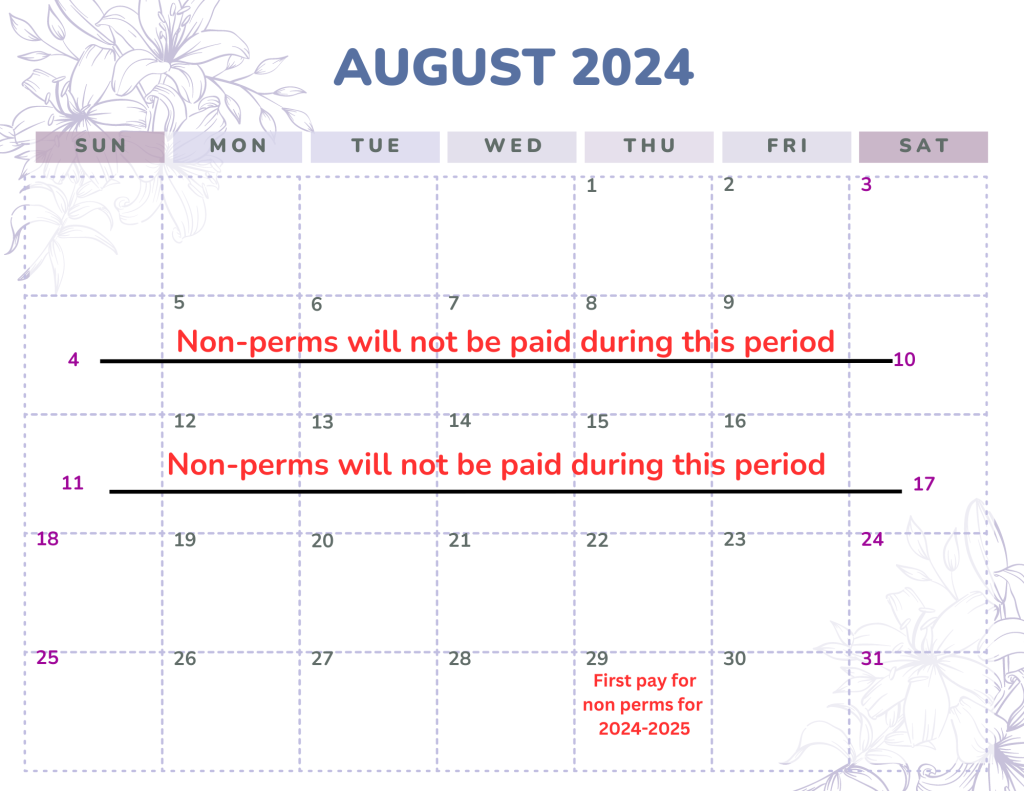





 Election Season
Election Season


 Local Activities
Local Activities FNEEQ Guide for Inclusive Communication
FNEEQ Guide for Inclusive Communication
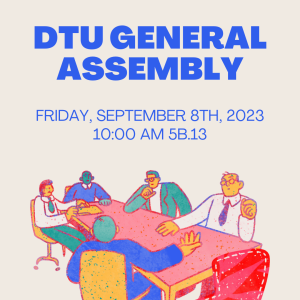 We have now been without a contract for five months.
We have now been without a contract for five months.















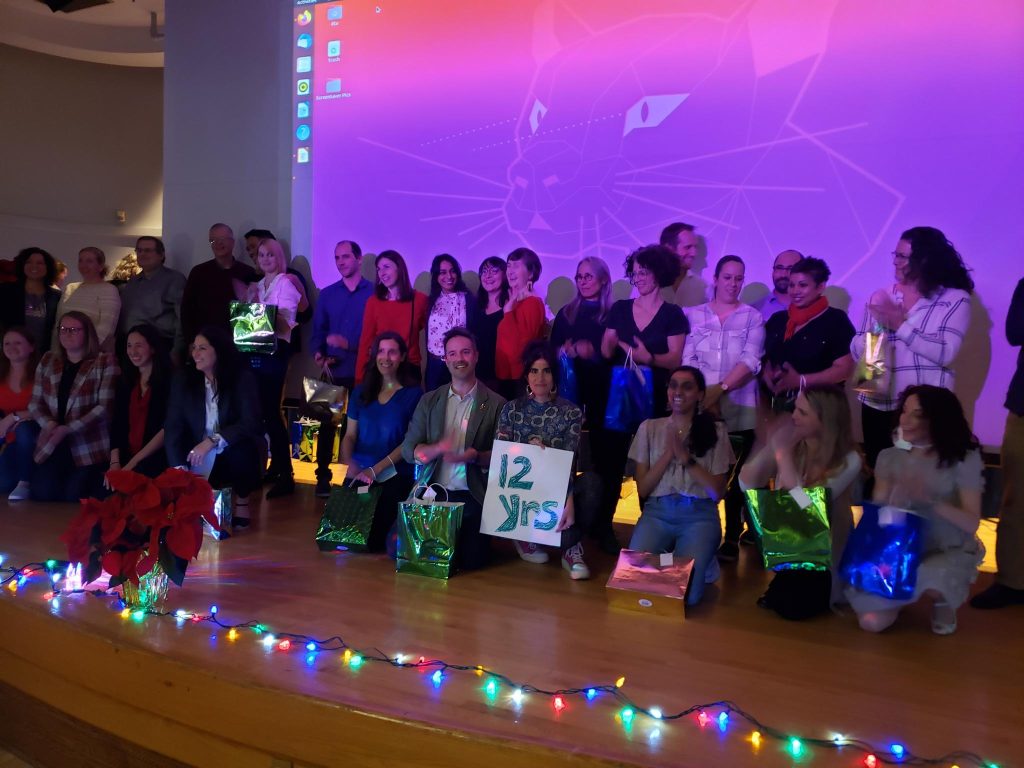


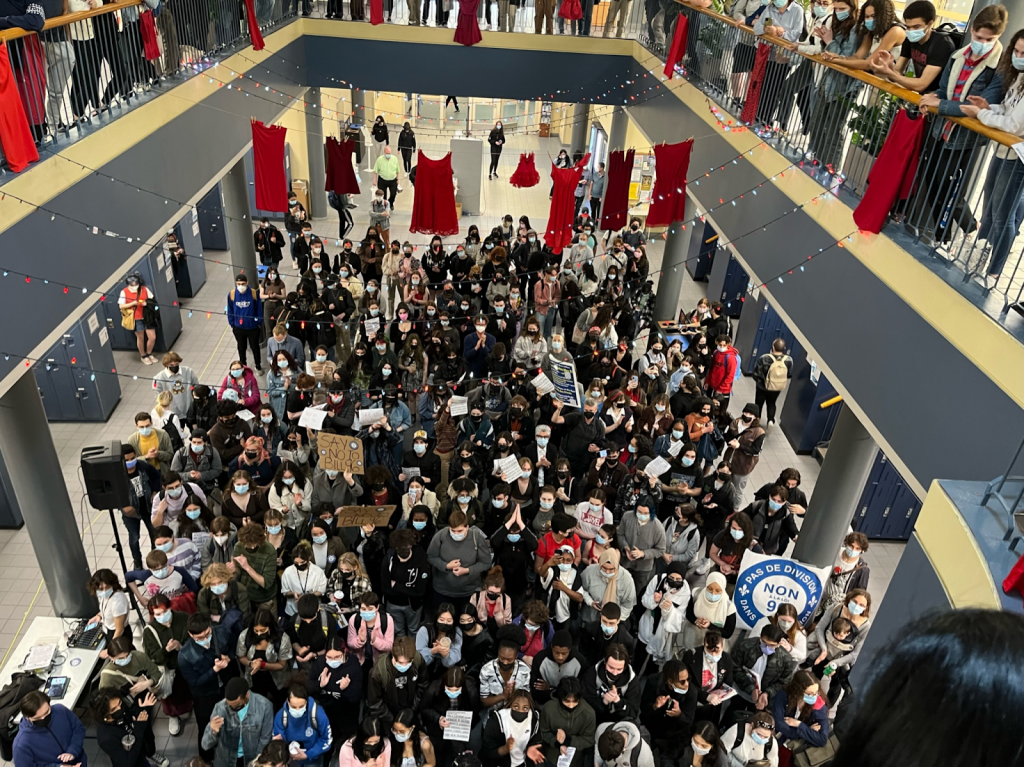
 The protest opened with several speeches from organisers of Anglophone community groups, political leaders, and Indigenous representatives. The speeches highlighted the detrimental impacts of the proposed law, both in terms of the impacts for education as well as more broadly for access to health and legal services. Reports on the protest appeared in both Francophone and Anglophone media outlets, such as
The protest opened with several speeches from organisers of Anglophone community groups, political leaders, and Indigenous representatives. The speeches highlighted the detrimental impacts of the proposed law, both in terms of the impacts for education as well as more broadly for access to health and legal services. Reports on the protest appeared in both Francophone and Anglophone media outlets, such as Since then, the College has continued to be conservative in its approach to granting leaves. Although the College has not officially declared a change in its policies concerning anticipated sabbatical leaves and gradual retirement, there has been a clear change in practice. In all recent cases, teachers asking for an anticipated sabbatical or gradual retirement plan to take place over a period of five years have been declined, and only requests taking place over a shorter period have been approved.
Since then, the College has continued to be conservative in its approach to granting leaves. Although the College has not officially declared a change in its policies concerning anticipated sabbatical leaves and gradual retirement, there has been a clear change in practice. In all recent cases, teachers asking for an anticipated sabbatical or gradual retirement plan to take place over a period of five years have been declined, and only requests taking place over a shorter period have been approved. 
